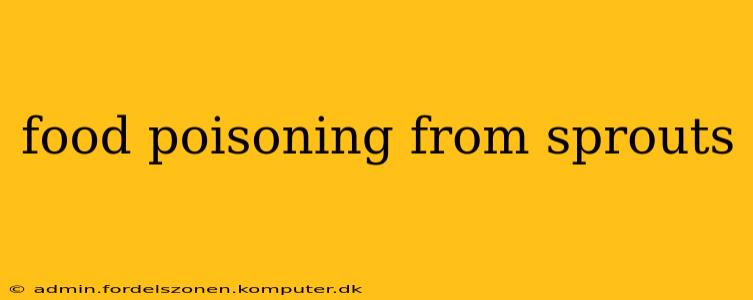Sprouts, those seemingly healthy additions to salads and sandwiches, can unfortunately harbor harmful bacteria that cause food poisoning. This comprehensive guide will explore the risks, symptoms, prevention, and treatment associated with sprout-related illnesses. Understanding these factors is crucial for minimizing your risk and ensuring food safety.
What Bacteria Cause Food Poisoning from Sprouts?
Several bacteria can contaminate sprouts, leading to food poisoning. The most common culprits are:
- Salmonella: A leading cause of foodborne illness, Salmonella can cause diarrhea, fever, and abdominal cramps.
- E. coli (Escherichia coli): Certain strains of E. coli, particularly those producing Shiga toxin, can lead to severe illness, including hemolytic uremic syndrome (HUS), which can cause kidney failure.
- Listeria monocytogenes: This bacterium is particularly dangerous for pregnant women, newborns, older adults, and people with weakened immune systems. Listeria infection can lead to serious complications, including miscarriage, stillbirth, and meningitis.
These bacteria are often present in the soil or water used to grow sprouts, making contamination a significant concern.
How Can I Tell if My Sprouts Are Contaminated?
Unfortunately, you can't tell if sprouts are contaminated just by looking at them. The bacteria are microscopic and invisible to the naked eye. This is why safe handling and sourcing are so critical.
What are the Symptoms of Food Poisoning from Sprouts?
Symptoms of food poisoning from sprouts vary depending on the bacteria involved and the individual's immune system, but commonly include:
- Diarrhea: This is often the most prominent symptom, ranging from mild to severe.
- Nausea and Vomiting: These symptoms can be debilitating and lead to dehydration.
- Abdominal Cramps and Pain: Severe stomach pain is a common indicator of foodborne illness.
- Fever: A fever may indicate a more serious infection.
- Headache: Headaches are another potential symptom.
- Bloody Diarrhea: This warrants immediate medical attention, as it may suggest a serious infection like E. coli.
How Long Does it Take for Symptoms to Appear After Eating Contaminated Sprouts?
The incubation period—the time between eating contaminated sprouts and the onset of symptoms—varies depending on the specific bacteria. It can range from a few hours to several days. For some bacteria, like Salmonella, symptoms usually appear within 6 to 72 hours. However, for others, the symptoms might appear later.
What Should I Do if I Think I Have Food Poisoning from Sprouts?
If you suspect you have food poisoning from sprouts, it's essential to seek medical attention, especially if you experience severe symptoms like bloody diarrhea, high fever, or signs of dehydration. Prompt treatment can prevent complications.
Meanwhile, focus on:
- Rehydration: Drink plenty of fluids to replace lost electrolytes and prevent dehydration. Oral rehydration solutions are helpful.
- Rest: Get plenty of rest to allow your body to recover.
- Bland Diet: Eat bland foods like toast, crackers, or rice to avoid further irritating your digestive system.
How Can I Prevent Food Poisoning from Sprouts?
Preventing food poisoning from sprouts requires careful attention to sourcing and handling:
- Choose Reputable Suppliers: Buy sprouts from reputable suppliers who adhere to strict safety standards. Look for brands that emphasize food safety in their practices.
- Thorough Cooking: Cooking sprouts to an internal temperature of 165°F (74°C) kills most harmful bacteria. However, note that some people might prefer to eat sprouts raw, so this isn't always practical or palatable.
- Proper Storage: Store sprouts properly in the refrigerator to slow bacterial growth. Use them as soon as possible.
- Handwashing: Always wash your hands thoroughly before and after handling sprouts.
Are All Sprouts Equally Risky?
While all sprouts can potentially harbor bacteria, some types are considered riskier than others due to their growth conditions. Alfalfa sprouts are frequently associated with outbreaks. However, other sprouts such as radish, mung bean, and clover can also be problematic.
Can I Eat Sprouts Safely?
Yes, you can enjoy sprouts safely by taking the necessary precautions outlined above. Choose reliable suppliers, practice proper hygiene, and cook thoroughly if unsure. However, understand that inherent risks remain, and even careful practices don't guarantee 100% safety. Weigh the risks and benefits based on your individual circumstances and tolerance for risk.
This information is for general knowledge and does not constitute medical advice. Always consult a healthcare professional for any health concerns.
